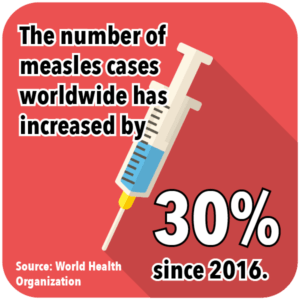
Although the anti-vaxxers movement has become increasingly problematic across the nation, the University of Rhode Island has taken many precautions to ensure that students are protected from preventable infections.
Nationwide, the anti-vaxxers movement has resulted in a comeback of some previously eradicated diseases, such as measles and tetanus.
The World Health Organization (WHO) has recently described the refusal of vaccinations to be among the world’s top health threats. Vaccines prevent around two to three million deaths per year, but between 2001 and 2015, the number of unvaccinated babies has quadrupled.
“It’s crazy what the spread of misinformation can do,” said Alex Labossiere, a senior microbiology major at URI. “It’s nuts. From a scientific standpoint it brings us back like 60 years.”
Measles is just one of the diseases that has re-emerged recently despite being easily preventable with immunizations. The Center for Disease Control and Prevention (CDC) declared measles to be eradicated in the U.S. in 2000. Yet as of March 14, 2019 around 268 measles cases have been confirmed in 15 states.
“Most American doctors have not even seen measles due to successful vaccine campaigns,” said Dr. Christopher Nasin, chief medical director for URI Health Services.
Before entering URI, students must produce a copy of their immunization record to ensure that they are up to date with all of their state-required vaccinations. If not, a negative service indicator is put up in e-Campus so that the student can not register for classes or make changes to their schedule.
“We track students immunization records very closely,” said Ellen Reynolds, URI Health Services director. “It is very rare that we have a student with a medical or religious exemption.”
Reynolds also said it is important for students who can be vaccinated to get all required immunizations. “We need to take every vaccine that we can so that people who have an illness [that] doesn’t allow them to take vaccines [stay] healthy,” said Reynolds.
There is some discussion on social media websites as to why people who are vaccinated care about those who are not, as they are protected so they do not need to worry about themselves. However, Reynolds points out that vaccinations vary in effectiveness.
“Vaccines aren’t 100 percent effective for all people,” she said. “Even if you are vaccinated, you might only be 86 percent protected, so there is a chance of getting the disease.”
Because vaccines are not entirely effective and some individuals are unable to get vaccines due to previous medical conditions, Nasin emphasized the idea of herd immunity. Herd immunity is the resistance to the spread of infectious disease within a population that results if a high proportion of individuals are immune to the disease through vaccination.
“The more people in the community that aren’t vaccinated the more likely the diseases are likely to go from person to person and we’re more likely to see the reemergence of these diseases,” said Nasin. “This is how epidemics occur.”
According to the CDC, every state in the United States allows for medical exemptions from immunizations, while 47 states allow for religious exemptions and 17 states allow for exemptions on the grounds of personal beliefs. Rhode Island is among the states that allows for religious exemptions but not personal exemptions for vaccines.
One of the most important immunizations for college students to get is the meningitis vaccine. The CDC describes meningitis as the swelling of the protective membranes covering the brain and spinal cord. The University of Utah Health reports that college students are more vulnerable to diseases like meningitis because of the close proximity of everyone who lives in residence halls.
In her 16 years at URI, Reynolds says she has seen very few cases of meningitis on campus. However, Reynolds points out that Providence College had a meningitis outbreak a few years ago. “They had to immunize their entire campus for Meningitis B,” she said.
For most students at URI, the anti-vaxxer movement does not make any sense. “It seems like parents who do not vaccinate their children are making light out of something incredibly serious,” said junior environmental economics major Max Smith.
Nasin and Reynolds believe that people who are against vaccinations are generally motivated by fear and pure unawareness.
“These people do not have any idea what some of these diseases are like,” said Nasin. “So it is fear of vaccines combined with having no experience with the disease itself that drives the anti-vaxxer movement.”
Nasin added that the best way to stop the anti-vaxxers movement is through marketing.
“Who do people listen to,” Nasin said. “I think a lot of people are distrustful of scientists. I think if we rely on some of our stars speaking up about the importance of vaccinating it can make a difference.”





